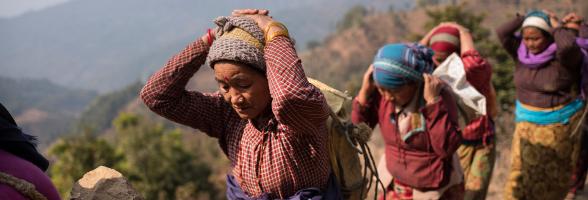Ulaanbaatar, Mongolia, 3 July 2018—International nonprofit Oxfam calls on government leaders gathering at the 8th Asian Ministerial Conference on Disaster Risk Reduction (AMCDRR), in Ulaan Baatar, Mongolia, this week, to build on the gains of the work to combat disasters in the last few years, and protect the future of Asia.
“Oxfam is keen to continue to work with Asian leaders in diminishing the risks of poor people to disasters. Asian governments have laid the groundwork, passing laws around and setting up offices for disaster risk reduction. In the next few years, to achieve a more resilient Asia, governments should strengthen the ability of local organizations and communities to deal with disasters, invest in social safety nets, and pour more funds into the work on reducing disaster risks. These three key actions will ensure that Asia is prepared for the harrowing impacts of climate change and disasters projected to batter the region,” said Lilian Mercado, Regional Director of Oxfam in Asia.
According to the Intergovernmental Panel on Climate Change: “People living in low-lying coastal zones and floodplains are probably most at risk from climate change impacts in Asia. Half of Asia’s urban population lives in these areas. Compounding the risk for coastal communities, Asia has more than 90% of the global population exposed to tropical cyclones.”
Firstly, Asian leaders must rally behind the “Grand Bargain”, an agreement made in 2016 by aid providers, donors, and international nongovernmental organizations to let local organizations lead humanitarian work in their home countries. One of its proposed changes is to allow local groups to directly access 25% of global funding for emergencies instead of going through an international organization.
“Humanitarian work must go local. Local organizations and communities know the context intimately and, therefore, are in a better position to lead emergency responses. They are also the first responders to any disaster. Local response is the only sustainable means to take on the projected scale, frequency, and severity of climate extremes and disasters,” said Mercado.
Secondly, Asian ministers can effectively mitigate disaster risks through strong social safety nets. Shocks and stresses negatively affect poor countries much more acutely than rich countries. South Asia, for example, suffers from floods 15 times greater, as a percentage of GDP, than OECD countries, according to an Oxfam report.
“Safety nets like insurance, conditional cash transfers, minimum wage legislation, and access to essential services are crucial for poor people to bounce back from a crisis. Any humanitarian intervention therefore must form part of or support sustainable development programs. Without livelihood and health care, for example, a poor family is at great risk to disaster,” said Mercado.
Finally, Asian governments must commit to bigger funds for blunting the risks from disasters, which when complemented with a mix of solutions and political will, is more cost-effective. “A concerted effort to invest in research, as well as to develop accountability mechanisms will ensure that financing disaster risk reduction work will benefit poor and vulnerable people. Asian ministers can make this a priority across the region,” said Mercado.
“Governments have the power to help poor and vulnerable communities to deal with and thrive despite disasters. At the same time, vulnerable communities, when included in decision-making and given the right support, can themselves be a part of solutions to build their resilience,” said Mercado.
The 8th AMCDRR aims to review progress of the Sendai Framework, an international agreement signed by United Nations Member States in 2015 that sets out ambitious targets to reduce risks from disasters. // ENDS
For more information, please contact Nipuna Kumbalathara, Media Officer of Oxfam in Asia, at nipuna.kumbalathara.oxfam.org
In the photo:
The communities living in Ghairung, Ghorka, take part in an Oxfam-funded Cash for work scheme to rebuild a 5km trail destroyed by the massive 7.6 magnitude earthquake that struck Nepal in 2015. The trail connects two villages, a health centre, and a local market and will benefit 1,140 households. The earthquake left nearly 9,000 people dead and destroyed or damaged more than 850,000 homes. Photo: Kieran Doherty / Oxfam



